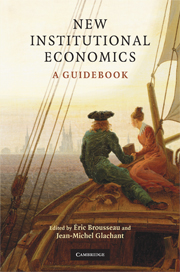Book contents
- Frontmatter
- Contents
- List of tables
- List of figures
- List of contributors
- Acknowledgements
- Foreword
- A Road Map for the Guidebook
- Introduction to New Institutional Economics: A Report Card
- Part I Foundations
- Part II Methodology
- Part III Strategy and Management
- 9 New Institutional Economics, Organization, and Strategy
- 10 Inter-Firm Alliances: A New Institutional Economics Approach
- 11 Governance Structure and Contractual Design in Retail Chains
- Part IV Industrial Organization
- Part V Institutional Design
- Part VI Challenges to Institutional Analysis
- Notes
- References
- Index
9 - New Institutional Economics, Organization, and Strategy
Published online by Cambridge University Press: 06 July 2010
- Frontmatter
- Contents
- List of tables
- List of figures
- List of contributors
- Acknowledgements
- Foreword
- A Road Map for the Guidebook
- Introduction to New Institutional Economics: A Report Card
- Part I Foundations
- Part II Methodology
- Part III Strategy and Management
- 9 New Institutional Economics, Organization, and Strategy
- 10 Inter-Firm Alliances: A New Institutional Economics Approach
- 11 Governance Structure and Contractual Design in Retail Chains
- Part IV Industrial Organization
- Part V Institutional Design
- Part VI Challenges to Institutional Analysis
- Notes
- References
- Index
Summary
Introduction
Although the roots of research into business strategy were seeded in the late 1960s with Igore Ansoff and Richard Brandenburg (1967), the field broke through to the surface and began to grow quickly in the 1970s and early 1980s. In particular, 1980 was a watershed year because of the launching of the field's first major journal, the Strategic Management Journal, and Michael Porter's (1980) book, Competitive Strategy, which was heralded in the business community. Since then research into business strategy has been a “growth opportunity,” attracting scholars from many disciplines and subdisciplines and publishing an increasing number of papers each year in a widening number of journals of both general and special interest. Transaction cost economics (TCE) is one of the subdisciplines that planted seeds in the strategy field and nurtured them with notable success. The good news for those studying TCE is that the field of strategy remains fertile and, in our opinion, TCE remains a useful tool for planting many more seeds as well as for harvesting opportunities.
Research into business strategy is motivated by three questions: (1) Why do some firms earn more rents than other firms, even in the same industry? (2) Why do performance differences persist? And (3) what can managers do to earn higher and enduring rents for their firms? (For a discussion, see Rumelt, Schendel, and Teece 1991.
- Type
- Chapter
- Information
- New Institutional EconomicsA Guidebook, pp. 183 - 208Publisher: Cambridge University PressPrint publication year: 2008
- 9
- Cited by



